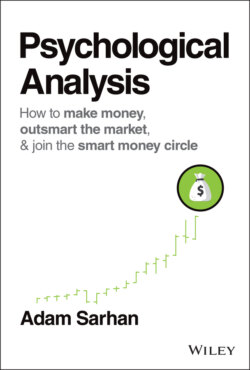Читать книгу Psychological Analysis - Adam Sarhan - Страница 39
WHAT IS “THE MARKET”?
ОглавлениеThe best investors (and traders) in the world have clarity. They are focused, they know exactly where they excel, and they know what they are doing. Everyone else is confused, lost, or just dabbles in different things. In order to thrive on Wall Street, I strongly recommend that you define yourself and learn how to master one specific style, and resist the temptation to be a jack of all trades. This chapter is intended to help give you clarity, cover some basic concepts, help you define yourself, explain timeframes in the market, and give you a strong foundation to succeed.
There are many financial markets in the world, some private and some public. For the scope of this book, I will be talking about free publicly traded markets. There are free, publicly traded markets for every major type of asset class: commodities, bonds, derivatives, and currencies—and then there are equities markets, also known as stock markets. Virtually every major country in the world hosts a financial exchange (a stock market) but, for the purpose of this book, when I talk about “the stock market” or simply “the market,” I will be referring to the U.S. stock market. As of this writing, the two major U.S. stock markets (the New York Stock Exchange and Nasdaq) combined represent about 46% of the global equities market.
Markets are undoubtedly complicated, and traders and investors can spend a lifetime learning all their subtle nuances. However, whether you're buying shares of Amazon on Nasdaq or selling sunflower seed futures on the South African SAFEX, all markets share some core principles.
At the most basic level, the market consists of buyers and sellers. For every trade you make, there is someone on the other side. If you're buying, someone else must be selling. If you're selling, there must be a buyer. While everyone has their own independent motivations for why they take an action in the market, you can bet that the one universal constant is that every trader hopes to make money.
At first, looking at stock charts can be confusing, but it's important to understand that there are only three ways a market can move: up, down, or sideways. That's it. It doesn't matter if you are buying shares of the hottest tech stock, real estate, crude oil—or anything else freely traded in a market; at the most basic level, every market in the world, private or public, can only move up, down, or sideways.
Armed with that knowledge, traders can take only three actions in any market: they can buy, sell, or hold. Sure, there are different mechanisms for making a trade or triggering an action, but despite all the perceived complications—the frantic action on the trading floor, the near‐light‐speed fervor of high‐frequency computer trading—ultimately, the only actions of consequence in any market are buying, selling, or holding.
To put it all into perspective, buyers and sellers interact in a market where asset prices go either up, down, or sideways, and they either buy, sell, or hold those assets. That's it. Everything else comes second.
It is also important to remember that the market does not care about you. The market is not your mommy. The market is neutral and does not have an agenda. It is not here to cuddle you or make you feel good (or bad, for that matter). It just exists. It will open and close whether you decide to trade or stay on the sidelines. If you want a friend, get a dog. If you want to feel good, call your mother. The market is famous for humbling even the most confident traders, and it doesn't owe you anything. It doesn't know you, and it doesn't care who you are.
Also, it's important to understand that markets are counterintuitive in nature. The basic way we are programmed to operate in the world doesn't work in this business. Most people are taught to live in a box, follow rules, obey someone else, and become what I call a George Jetson (from the old cartoon, where the main character just pushed the same button over and over for eight hours and then went home). To be successful in this business, you must learn how to think and act independently. That's not easy because people are social creatures and there is a “safety” in numbers (following the herd/crowd).
People crave certainty, but markets, by definition, are uncertain. You've got to get used to this fact if you're going to be a trader. People also like to contribute or feel like they are accomplishing something or helping in some capacity. Literally, there's nothing that you can do in the market to help it. Just like the ocean, there's nothing you can do by standing on the shore hitting the waves that will impact the ocean. The same with the market. Each trade is akin to hitting a wave or tossing a stone into an ocean.
